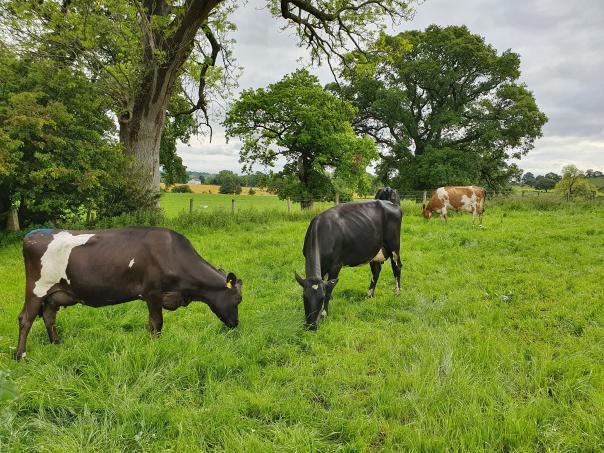
Of the many challenges I’ve faced in my career, the opportunity to make an impact at Nestlé presents one of the biggest, but potentially one of the most rewarding.
We need change, and industry collaboration and employee buy-in will be critical over the coming years if the sector is to achieve impact at scale.
My role at WWF focused on engaging with businesses and policy makers to advocate a more sustainable and equitable food system. I spent a lot of time talking to business leaders to get them to drive change. By making the move to Nestlé, I now have the opportunity to play a key role, driving change from the inside.
The scale and reach of Nestlé is huge, and as a consequence, so is the impact we can have. But no one organisation can do it alone.
Internally I work with colleagues in different product categories and business functions. Externally, I collaborate with NGOs [non-governmental organisations], policy makers and peers in the business community.
It involves trying to win hearts and minds, asking people to think and act differently and to challenge the norm. But it’s incredibly rewarding, seeing all the small steps add up to make a big difference.
One of the biggest challenges is reaching, engaging and coordinating across the organisation. I’ve been at Nestlé for over a year now and I’m still learning about new and exciting activities happening in different areas across the business.
Building a sustainability mindset into the business is a key focus of my job. Luckily, I work in an organisation full of passionate, driven colleagues who all want to play their part.
Channelling this into implementation is the next big hurdle, but we’re doing this in a number of ways. We’re actively engaging and training colleagues through immersive deep dives on sustainability to help build capability and provide a safe space for all the tricky questions.
We’re also working to create an environment that encourages colleagues to exchange ideas and innovate and we’re building sustainability into the personal development plans of employees to ensure it becomes part of how we do business.
To help other organisations we’ve gathered sector-specific insight and examples, plus advice from industry experts to create our recent, Empowering Sustainability Heroes report.
It demonstrates how sustainability can be part of everyone’s job and provides actionable tips and ideas from across the foodservice industry. The goal is to inspire and inform a new breed of sustainability heroes, so they can take action and have a positive impact for people and the planet.
Within Nestlé the lion’s share of organisational impact is in our agricultural supply chain, which is why the mainstay of our net zero climate commitment and sustainability promise is to ‘advance regenerative food systems at scale’.
We’re working with our farmers and suppliers to ensure that they’re farming in a way that stores carbon in the soil, enhances biodiversity and protects our natural resources.
An example is our Milk Plan with Nestlé’s milk supplier ‘First Milk’ in Scotland. This has involved building trust and long-term relationships with our First Milk dairy farmers to pilot new regenerative practices and assess the outcome.
We’ve invested in state-of-the-art analysis to measure the changes in soil carbon in a scientifically robust and cost-effective way. so we can accurately monitor the effectiveness of regenerative practices over time. As a result, we have rigorous processes in place and are on track to reduce our emissions from milk by 50% by 2026.
To deepen our understanding of agricultural science, we recently launched our Nestlé Institute of Agricultural Sciences. Working with academic institutions, research organisations, industry partners and farmers, this is exploring the most promising agricultural technologies, enabling farmers to transition to regenerative practices at scale.
At the same time, we’re moving to 100% renewable energy in our operations and logistics; all of our grid-supplied energy in the UK&I is already 100% renewable.
We’re also making sure our packaging is recyclable and reusable. Plastic packaging plays an important role in getting our products safely to consumers, keeping them fresher for longer and avoiding food waste. It’s lightweight, safe and versatile making it a useful material, but we also recognise the environmental impact when packaging ends up in nature.
That’s why we’re taking steps to ensure our packaging is 100% recyclable or reusable by 2025. Over the same timeframe, we’re reducing our use of virgin plastic by a third.
We’ve made good progress already. By reducing the use of plastic in our confectionery sharing bags by 15%, we’ve saved around 83 tonnes of virgin plastic every year and saved 130 tonnes of carbon emissions in turn. Moving our Smarties range from plastic to paper packaging eliminated around 250m plastic packs sold globally every year. And through launching Podback – our coffee pod recycling scheme - with coffee sector peers, we’re recovering used coffee pods and coffee grounds.
But we still have a lot of work to do and to help us identify the most safe and sustainable packaging solutions for the future, we’re investing in research and innovation in our Nestlé Institute of Packaging Sciences.
We also want to provide consumers with choices that help them have a healthier, more sustainable diet. Opting to reduce animal products in one’s diet is a great way to do this, so we’ve been working to provide more plant-based options for consumers. From launching our Vegan KitKat, to our new plant-based milk Wunda, made from pea protein, through to launching our Garden Gourmet range of plant-based alternatives.
Net zero by 2050 is our clear goal, but the way there is not entirely clear nor easy. It’s important that we move swiftly – with bold commitments, empowered employees and an openness to partnership and collaboration - because only through taking decisive and positive action now will we be able to get there and play our role in tackling the climate and nature crises.